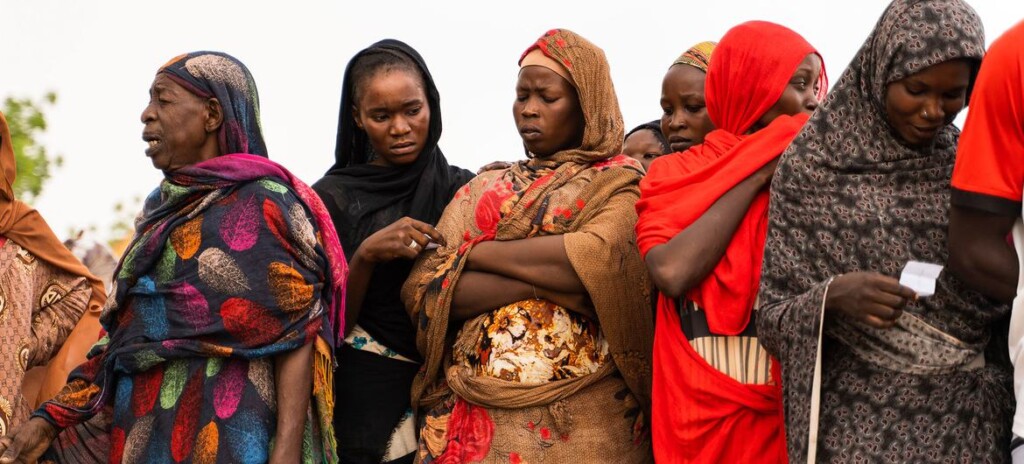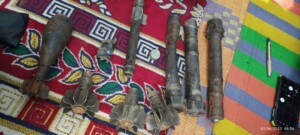Sudan’s women ‘bear the brunt of war as maternal deaths surge’

Sudanese women waiting for aid distribution in Wad Madani, El Gezira, Sudan (File photo: UNOCHA / Ala Kheir)
Prepared by Azza Mohammed for Sudan Media Forum
Sudan’s brutal war between the Sudanese Armed Forces (SAF) and the paramilitary Rapid Support Forces (RSF), now entering its third year, has exacted a devastating toll on women, whose suffering is deepening amid a near-total collapse of the country’s health system. Maternal mortality has surged, with pregnant women and new mothers among the most vulnerable in a country plagued by displacement, hunger and poverty.
The maternal mortality rate has climbed to 295 deaths per 100,000 live births, according to figures from the Federal Ministry of Health. Health Minister Haitham Mohammed Ibrahim stated that “the number of pregnant deaths observed between June 2023 and July 2024 reached 870 deaths, including 350 deaths that occurred inside hospitals and health facilities.”
The World Health Organisation (WHO) estimates that more than 1.1 million pregnant women in Sudan now lack access to basic services such as antenatal care, safe delivery and postpartum care.
‘A mother’s loss’
Nora, a grieving mother from Gereida in South Darfur, knows this suffering all too well. Her pregnant daughter, critically ill in her final months, was transferred to Merowe Hospital in Sudan’s Northern State after a journey of thousands of kilometres. She died shortly after giving birth.
With sorrow etched on her face and her newborn granddaughter tied to her back, Nora was seen praying as she waited for transport in Ed Debba in North Darfur, beginning the painful return to Gereida alone with the infant. She had spent five months stranded due to a lack of funds, sheltering overnight in the Housh Melit camp in North Darfur before continuing her journey.
Locals told Radio Dabanga that health services in Gereida are virtually non-existent. The area’s three administrative units share a single rural hospital, one without essential equipment, medical staff or even an X-ray machine, forcing residents to make arduous trips to Nyala in South Darfur, for basic medical tests.
‘War exacerbates health crisis’
“The issue of maternal deaths due to war is one of the most concerning files for all those working in health and human rights,” said Health Minister Ibrahim. He confirmed a child mortality rate of 51 deaths per 1,000 live births.
The UN had previously estimated Sudan’s maternal mortality rate at 270 deaths per 100,000 live births. Since the war, the Federal Ministry of Health now reports a staggering figure of 100 deaths per 10,000 births, a number echoed by the WHO and UNICEF.
Dr Adiba Ibrahim, a member of the Sudanese Medical Association, warned that 90 percent of the country’s health institutions have collapsed. “This has worsened the health care situation, especially in conflict zones,” she said.
According to her, the Organisation for the Fight Against Violence Against Women and Children recorded more than 316,000 deaths from cholera and 576,000 from dengue fever. She also cited 176,000 pregnant women suffering from malnutrition, 850,000 lactating women dead, and 45,000 children who died due to malnutrition.
Speaking to Madaniya News, Dr Adiba reported 679 cases of sexual assault, including 256 cases involving children aged between 5 and 16 years.
‘Lives in limbo’
For displaced families, the struggle to access even the most basic care continues. In the northern town of Tanqasi, a village situated on the western bank of the River Nile, around 17 kilometres downstream from Merowe, 70-year-old Radia from North Darfur now sleeps on the ground in front of a hospital with her injured daughter and young son. They fled an aerial bombardment in Melit, North Darfur, but the trauma did not end with displacement.
Her daughter lies on a rented bed, suffering from an untreated foot injury. The family cannot afford the hospital’s daily fee of SDG25,000, let alone the SDG500,000 operation cost. “We share meals with other patients,” Radia said, “but at night, I endure the cold alone, praying for enough to save my daughter.”
Radia’s story mirrors those of thousands of Sudanese who have lost their homes, livelihoods and dignity amid relentless fighting between the SAF and the RSF.
The war has devastated women’s access to healthcare, leaving them to traverse long distances under dangerous conditions, often with tragic outcomes.

The Sudan Media Forum calls attention to the escalating crisis and urges stakeholders to address the health emergency affecting women and children.
This report is part of the Sudan Media Forum’s wider efforts to highlight the human cost of Sudan’s war, and the urgent need for humanitarian and medical intervention, particularly for women who continue to bear the brunt of this ongoing conflict.
#SilenceKills #الصمت_يقتل #NoTimeToWasteForSudan #الوضع_في_السودان_لايحتمل_التأجيل #StandWithSudan #ساندوا_السودان #SudanMediaForum











 and then
and then